#today explained
Explore tagged Tumblr posts
Text
New ep is up!
5 notes
·
View notes
Text
I just listened to the most recent episode of Today Explained about the new COVID variant/vaccines and I want to scream. Usually I really like Today Explained. (I think it’s often better than the Daily.) But this episode? Jesus fucking Christ.
The overall message? Meh don’t worry so much about getting COVID, it’s fine! Yeah yeah you should def get the vaccine. Oh, long COVID? *Shrug* almost nobody gets that anymore. Don’t worry about it. Day 5 of your infection and you’re feeling fine? Sure go out the bar with your friends, you’re probably not shedding virus anymore. It’s fine!
Irresponsible and infuriating.
2 notes
·
View notes
Text

filipina miku!! my mom helped me with her outfit ^_^
#THIS TOOK ME FOREVER RAAHHHH#i had help from my mom with stuff like the parts of the traje de mestiza which is the outfit shes wearing#this trend looks so much fun and i wanted to join in.. im first gen canadian though so ive never been to the philippines and only#know thru stories of my parents growing up. im proud of my heritage but there are some things i didnt grow up with that#make me feel disconnected from my culture. so it was nice to talk to my mom abt it and ask for her help with this :3#the pleated tapis is meant to resemble her skirt.. i had no way of adding her stockings but i noticed the piano key design#so i used that for the saya. the bandana is meant to resemble her hairties and shes wearing bakya wooden slippers with embroidery#i kinda wanted to add the panuelo to resemble her tie as a finishing touch but i forgor ;w; just imagine it i guess#my mom really likes this. shes a little confused abt the blue hair and i had to explain her hair is like that but she thinks shes pretty#originally i wanted her holding the woven pamaypay and fanning herself because ITS HOT ITS 25 FUCKING DEGREES TODAY#but i couldnt get the pose right so i settled for this. i wanna draw her and brazilian miku high fiving ill do that tmrw#my art#myart#hatsune miku#miku worldwide#philippines#vocaloid#miku
63K notes
·
View notes
Text

Paolo’s Podcast Recommendation: We Can't Trust Photos Anymore
Today, Explained Vox September 2024
Produced by: Hady Mawajdeh Edited by: Amina Al-Sadi Engineered by: Patrick Boyd Fact-checked by: Laura Bullard Hosted by: Noel King
#We Can't Trust Photos Anymore#Paolo’s Podcast Recommendation#Today Explained#Podcast#Now Playing#Spotify#Vox
0 notes
Text
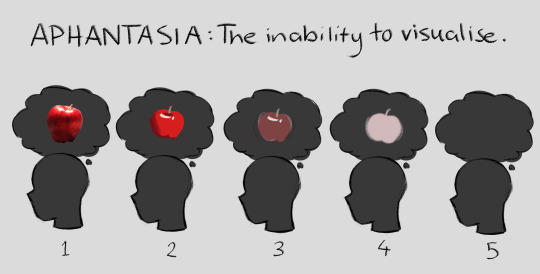
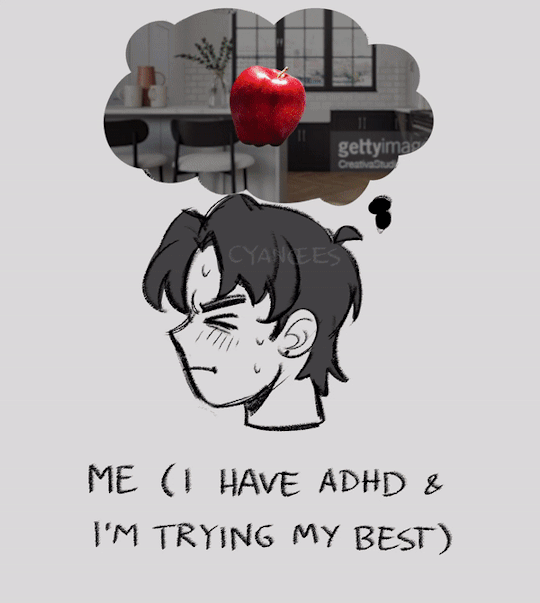
i have neither a good imagination nor aphantasia, but a secret third thing
#adhd#doodles#show this to your therapist instead of failing to explain it like i did#me: its like i cant control my thoughts like i was trying to think of something earlier today but#all i could think of was this giraffe eating leaves and no matter how hard i tried to focus the thought would just. replay#my therapist: what happens if you try to let the thought just play out#me: ........ i dont know but i dont want it to be there at all when im trying to do simple addition in a maths exam#10k#100k
179K notes
·
View notes
Text
Sean Rameswaram at Vox:
At the end of January, when Universal Music Group (UMG) failed to negotiate a new licensing deal with TikTok, it removed its entire music catalog from the app. Just like that, thousands of videos featuring music by artists like Drake, Taylor Swift, and Bad Bunny were suddenly silent.
UMG said it made the decision because TikTok offered to pay only a fraction of the rate that other social platforms offer. For its part, TikTok said that Universal was putting “their own greed above the interests of their artists and songwriters.” Some of those artists and songwriters have spoken out about the situation. “I think it’s ass-backward, and at the very least we should have known,” said Jack Antonoff to reporters in the press room after winning Producer of the Year at the Grammys earlier this month. “You got a whole industry being like, ‘You’ve got to do everything; you’ve got to do everything, and here’s where you’ve got to do it,’ and then one day it’s like, ‘Poof!’” Musicians aren’t the only ones upset about this disruption. Content creators like Jarred Jermaine, who breaks down music samples on TikTok, posted a video of himself in tears claiming that videos he created that contained UMG music were taken down. And dancer and content creator Lars Gummer told the Daily Beast that he went from “shocked” to “disappointed.”
“Most of my friends in LA are content creators, especially dance creators,” he said. “So immediately we all were angry about the decision made between UMG and TikTok.” In a recent episode of Today, Explained, digital activist and writer Cory Doctorow told host Sean Rameswaram that companies like TikTok “don’t have to care” about the disruption they cause their users. Doctorow coined the phrase “enshittification,” which he uses to describe a process that digital platforms use to lure customers in, giving them goods or an experience they can’t find elsewhere, only to make it worse for them down the line in order to better serve their business partners. “I think that the calculus that TikTok is making is that they would rather inflict pain on their customers than on their shareholders,” said Doctorow. “So whatever it is that Universal was asking, [TikTok’s] customers could live with that pain, with having the videos that they worked on for hours or days or weeks and put maybe thousands of dollars into suddenly rendered silent because TikTok decided not to step up for their interests.”
Totally disgraceful that UMG decided to pull off their songs from TikTok.
From the 02.09.2024 edition of Vox's Today, Explained:
0 notes
Text
I think that one thing people fail to understand is that unsolicited literary criticism coming from an online stranger who is reading with no knowledge of what the authors intended goal is, is not going to be received the same as say: the authors beta reader or friends who know what the authors intended goal and has the sufficient knowledge and input to help the author reach that desired outcome.
"But I'm only trying to be helpful" How do I know you have the knowledge and literary skill for you to be able to actaully do that when we don't know each other and you are essentially a stranger to me? Are you applying this criticism based out of personal biased experience and desire to see the story or characterization be driven in another direction or tweaked, or do you know the author's intentions for the character? If the story is incomplete, are you basing your criticism of a character on the incomplete narration with only partial information available of them or are you building up a report until the story's completion? Did the author provide you with the information needed to make a fully informed criticism?
Have you discussed with the author what their plans are or are you assuming them based off the narration, especially if the narration is proven or implied to be unreliable or missing key points of the plot? Are you unbiased enough to help them reach their desired outcome for the characters and story regardless of your personal feelings towards the characters/antagonists and setting? Can you handle being told your specific input isn't wanted because you're a reader and/or have no written anything relating to their genre or topic? Do you understand and respect that the author's personal experiences might influence their writing and make it different than how you would have done it personally? Do you understand if an author only wants input from a specific demographic relating to their story?
If it's for fanfiction or other hobby media, are you holding a free hobby to a professional standard? Are you trying to give criticism because you feel like the author has produced 'subpar job performance' of their fic? Are you viewing their work as a personal intimate outlet or something that must conform with mass media? Are you applying rules and guidelines when the fic is shared for simple sharing sake? Is your criticism worded appropriately and focused on the parts where the author has requested input on rather than a general dismissal and or disapproval?
Have you put yourself in a place where you assumed you have the input needed for the story to evolve better, or have you asked what the author needs and what they're having trouble with? Can you handle having your criticism rejected if the author decides their story doesn't need the change and not take it as a personal offense against your character? Are you crossing that boundary because you think you are doing the author a favor? Are you trying to be helpful, or do you just want to be?
I think sometimes when people hear authors go 'please don't give me unsolicited writing advice or criticism' they automatically chalk it up to 'this author doesn't want ANY constructive feedback on their stuff at all' and not "i already have trusted individuals who will help me with my writing goals and- hey i don't know you like that, please stop acting so overly familiar with me'
#small rant brought to you by: listened to my younger sibling's friend be very upset today because an original story she wrote gets bashed#the story itself is fine maybe a little fast paced but overall she was happy with it's progress#and there is this one dude who keeps trying to tell her that her story needs to go another direction to 'make sense' and it changes the end#after she's repeatedly explained she's happy with the outcome and does not want to expand on that plot point any further#dude says she's 'unreceptive to criticism' no dude you're just being a dick#constructive criticism helps the AUTHOR reach THEIR intended goal#not steer the story in the direction a reader wants to see it go#sara shush#pls don't reblog with any 'but i take unsolicited criticism all the time' this isnt about you. your boundary is not other people's boundary
5K notes
·
View notes
Text
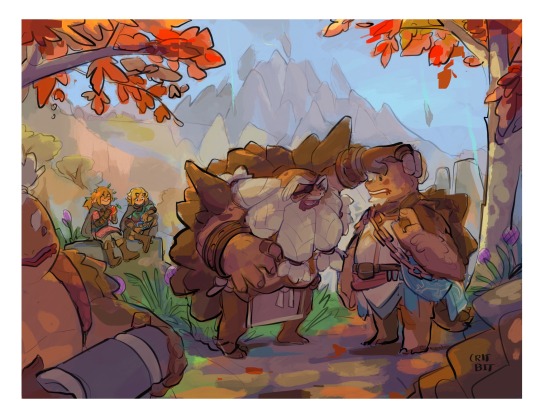
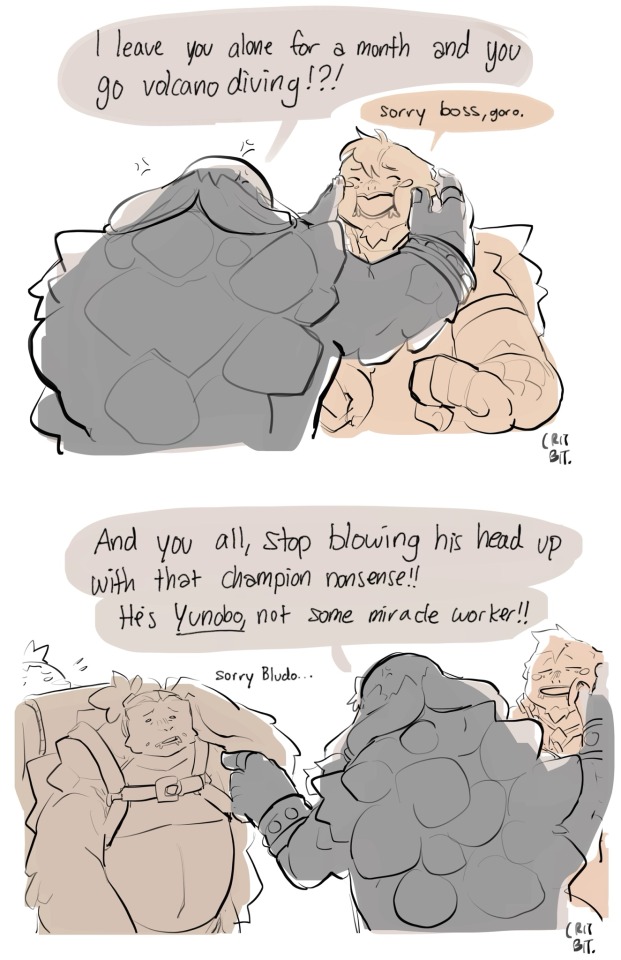
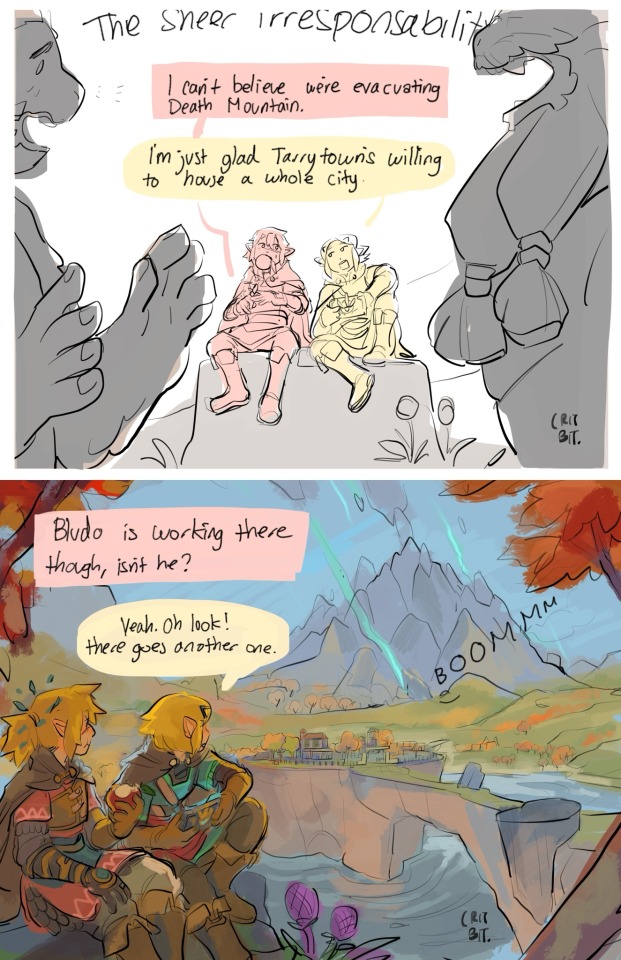
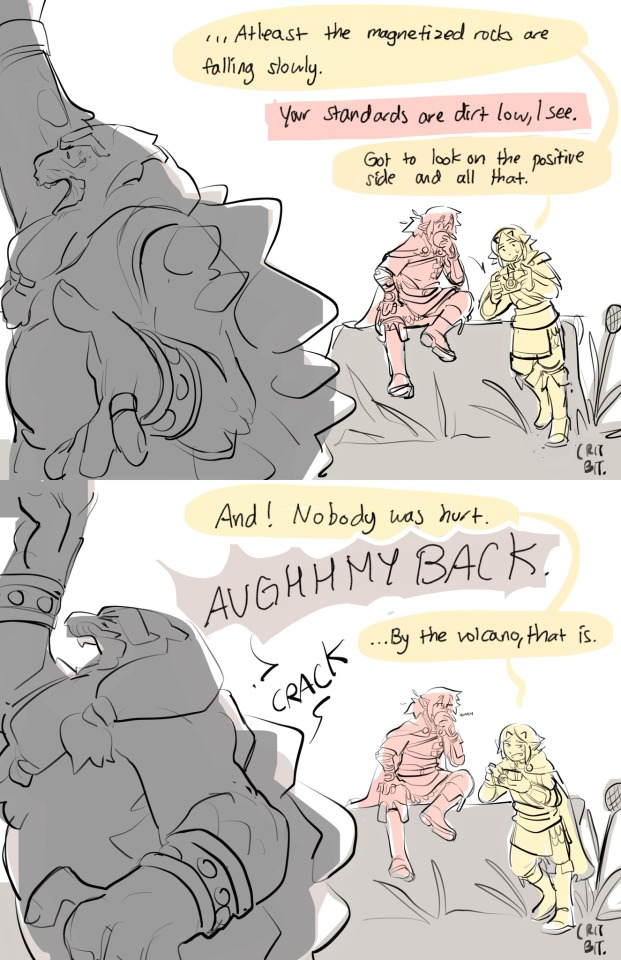
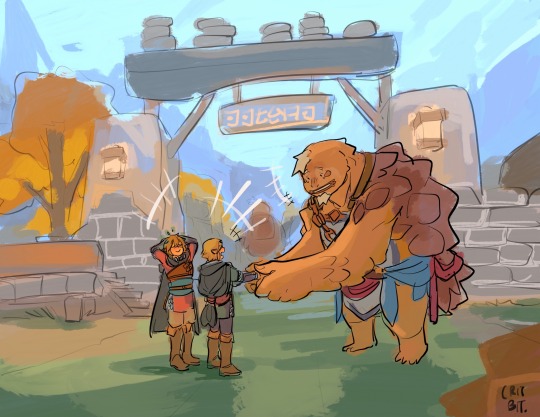
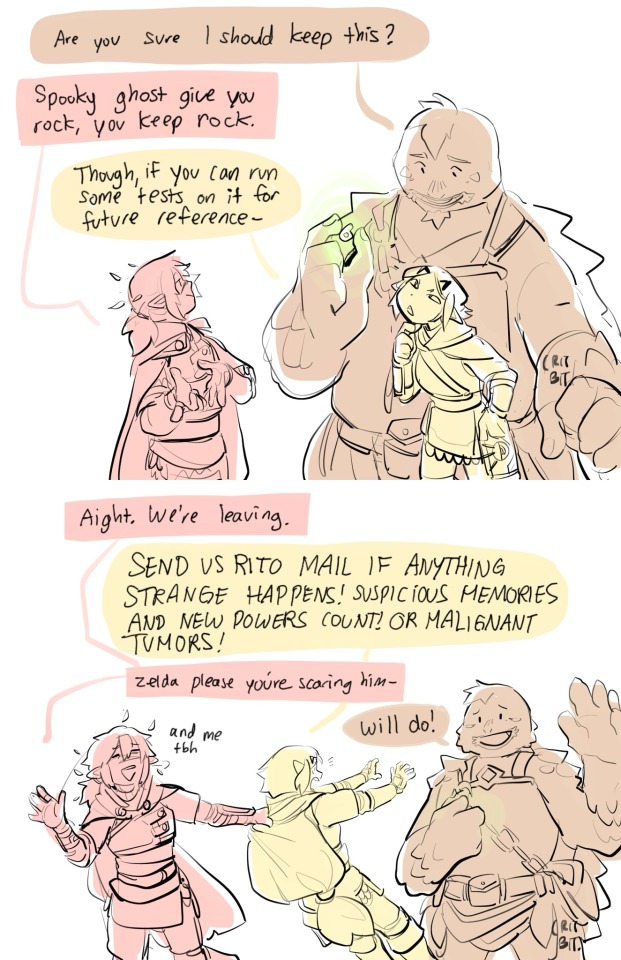
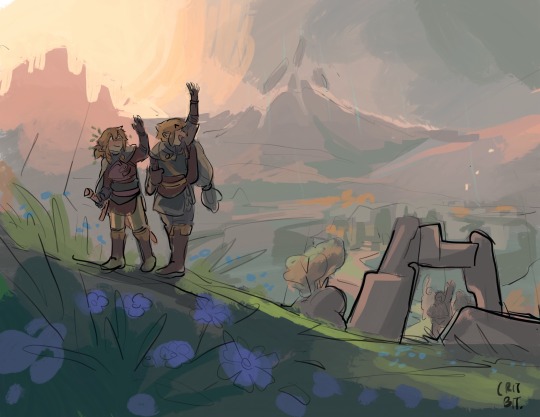
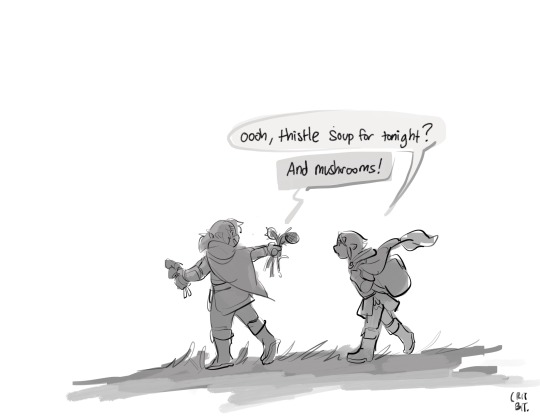
Linktober, Day 12: Tarry Town!
You defeat the final boss in the volcano causing the floating islands to float! Congrats. Unfortunately, with the destruction of the said monster, the islands are no longer floating and are, in fact, slowly coming down enmass as the magnesis scatters.
Zelda would like to point out people are much more likely to survive walking around slow giant rocks from the sky versus dodging flaming lava. She’s practicing this new thing called positive thinking.
(This is a totk au called Familiar Familiar where zelda does not go back in time! Click here to see the full comic masterlist)
(Plus my patreon!)
#lonks diary#critdraws#familiar familiar au#linktober 2024#art#loz#zelda#link#yunobo#totk#botw#totk au#botw au#breath of the wild au#breath of the wild#tears of the kingdom#totk zelda#totk link#totk yunobo#loz comic#tloz#tears of the kingdom au#legend of zelda#the legend of zelda#was at the renfaire yesterday so here’s an extra big post for today#anyways i think the gorons would enjoy tarry town#esp with all the fun construction that's happening there#also gorons are immune to fire but not squash damage so#gorons#also zelda going “tell me if your liver explodes” feels accurate? i dont know how else to explain it
4K notes
·
View notes
Text
Avishay Artsy at Vox:
The world’s eyes have been on Gaza since Hamas’s brutal attack on Israeli citizens on October 7 and Israel’s retaliatory invasion that has killed thousands of Palestinian civilians. But another front in this long-running conflict is the West Bank, a kidney-bean shaped piece of land on the west bank of the Jordan River and to the east of Israel that is home to nearly 3 million Palestinians and would make up the heart of any future Palestinian state. Alongside those Palestinian cities and villages, however, are Jewish settlements.
Since the Six-Day War of June 1967, the state of Israel has planned and funded Jewish outposts throughout the West Bank; other settlers have moved in without the state’s explicit backing. The settlers believe they have a right to be there, even though most of the international community views the settlements as illegal. These populations are largely separated by Israel’s complex security infrastructure, including military checkpoints, armed patrols, a separation barrier, and color-coded identification cards and license plates. This system dictates all aspects of daily life for West Bank residents. Some settlers have for years harassed and attacked the Palestinians living there, often with impunity and occasionally with the support of Israeli soldiers. In the weeks since October 7, however, the rate of violence has significantly increased. It is already the deadliest year since the Second Intifada, and is getting bad enough for the eyes of the world to occasionally leave Gaza and look to the West Bank.
“I continue to be alarmed about extremist settlers attacking Palestinians in the West Bank,” President Joe Biden said in late October, comparing the attacks to “pouring gasoline on fire.” Meanwhile, popular support for Hamas has surged among Palestinians in the West Bank as faith in the Palestinian Authority plummets. This escalation of settler violence could, as Vox’s Zack Beauchamp explains, “lead to a deeper entrenchment of Israel’s occupation and, quite possibly, a violent Palestinian response that brings outright war to the West Bank.” That would in turn “weaken the already-slim prospects of a negotiated solution to the Israeli-Palestinian conflict in the foreseeable future,” he writes.
The writer Nathan Thrall is well acquainted with the dual lives of Palestinian and Israeli residents of the West Bank. Thrall spent a decade at the International Crisis Group covering Israel, the West Bank, and Gaza. In his new book A Day in the Life of Abed Salama: Anatomy of a Jerusalem Tragedy, he tells the story of a Palestinian father from the West Bank searching for his son who’s gone missing after a school bus accident. Thrall spoke with Today, Explained host Noel King about the history of Israeli settlements in the West Bank, and why Israel faces strong criticism for its support of settlers, not just from Palestinians but also from some Israelis and the international community. Read on for an excerpt of the conversation that aired on November 20, edited and condensed for length and clarity, and listen to the full conversation wherever you find podcasts.
The Israel Apartheid State's Jewish Settlements in the occupied West Bank are fueling anti-Palestinian violence against the Palestinians living there.
From the 11.20.2023 edition of Vox's Today, Explained:
#Occupation of Palestine#Israel/Palestine Conflict#Palestine#Israel#Israel/Hamas War#Israel Apartheid State#Palestinian Authority#Vox#Today Explained#Noel King#Nathan Thrall#West Bank#Israeli Settlements
1 note
·
View note
Text
Today my therapist introduced me to a concept surrounding disability that she called "hLep".
[plain-text version of this post can be found under the cut]
Which is when you - in this case, you are a disabled person - ask someone for help ("I can't drink almond milk so can you get me some whole milk?", or "Please call Donna and ask her to pick up the car for me."), and they say yes, and then they do something that is not what you asked for but is what they think you should have asked for ("I know you said you wanted whole, but I got you skim milk because it's better for you!", "I didn't want to ruin Donna's day by asking her that, so I spent your money on an expensive towing service!") And then if you get annoyed at them for ignoring what you actually asked for - and often it has already happened repeatedly - they get angry because they "were just helping you! You should be grateful!!"
And my therapist pointed out that this is not "help", it's "hLep".
Sure, it looks like help; it kind of sounds like help too; and if it was adjusted just a little bit, it could be help. But it's not help. It's hLep.
At its best, it is patronizing and makes a person feel unvalued and un-listened-to. Always, it reinforces the false idea that disabled people can't be trusted with our own care. And at its worst, it results in disabled people losing our freedom and control over our lives, and also being unable to actually access what we need to survive.
So please, when a disabled person asks you for help on something, don't be a hLeper, be a helper! In other words: they know better than you what they need, and the best way you can honor the trust they've put in you is to believe that!
Also, I want to be very clear that the "getting angry at a disabled person's attempts to point out harmful behavior" part of this makes the whole thing WAY worse. Like it'd be one thing if my roommate bought me some passive-aggressive skim milk, but then they heard what I had to say, and they apologized and did better in the future - our relationship could bounce back from that. But it is very much another thing to have a crying shouting match with someone who is furious at you for saying something they did was ableist. Like, Christ, Jessica, remind me to never ask for your support ever again! You make me feel like if I asked you to call 911, you'd order a pizza because you know I'll feel better once I eat something!!
Edit: crediting my therapist by name with her permission - this term was coined by Nahime Aguirre Mtanous!
Edit again: I made an optional follow-up to this post after seeing the responses. Might help somebody. CW for me frankly talking about how dangerous hLep really is.
Plain-text version:
Today my therapist introduced me to a concept surrounding disability that she called "hLep".
Which is when you - in this case, you are a disabled person - ask someone for help ("I can't drink almond milk so can you get me some whole milk?", or "Please call Donna and ask her to pick up the car for me."), and they say yes, and then they do something that is not what you asked for but is what they think you should have asked for ("I know you said you wanted whole, but I got you skim milk because it's better for you!", "I didn't want to ruin Donna's day by asking her that, so I spent your money on an expensive towing service!") And then if you get annoyed at them for ignoring what you actually asked for - and often it has already happened repeatedly - they get angry because they "were just helping you! You should be grateful!!"
And my therapist pointed out that this is not "help", it's "hLep".
Sure, it looks like help; it kind of sounds like help too; and if it was adjusted just a little bit, it could be help. But it's not help. It's hLep.
At its best, it is patronizing and makes a person feel unvalued and un-listened-to. Always, it reinforces the false idea that disabled people can't be trusted with our own care. And at its worst, it results in disabled people losing our freedom and control over our lives, and also being unable to actually access what we need to survive.
So please, when a disabled person asks you for help on something, don't be a hLeper, be a helper! In other words: they know better than you what they need, and the best way you can honor the trust they've put in you is to believe that!
P.S. Also, I want to be very clear that the "getting angry at a disabled person's attempts to point out harmful behavior" part of this makes the whole thing WAY worse. Like it'd be one thing if my roommate bought me some passive-aggressive skim milk, but then they heard what I had to say, and they apologized and did better in the future - our relationship could bounce back from that. But it is very much another thing to have a crying shouting match with someone who is furious at you for saying something they did was ableist. Like, Christ, Jessica, remind me to never ask for your support ever again! You make me feel like if I asked you to call 911, you'd order a pizza because you know I'll feel better once I eat something!!
Edit: crediting my therapist by name with her permission - this term was coined by Nahime Aguirre Mtanous!
Edit again: I made an optional follow-up to this post after seeing the responses. Might help somebody. CW for me frankly talking about how dangerous hLep really is.
#hlep#original#mental health#my sympathies and empathies to anyone who has to rely on this kind of hlep to get what they need.#the people in my life who most need to see this post are my family but even if they did I sincerely doubt they would internalize it#i've tried to break thru to them so many times it makes my head hurt. so i am focusing on boundaries and on finding other forms of support#and this thing i learned today helps me validate those boundaries. the example with the milk was from my therapist.#the example with the towing company was a real thing that happened with my parents a few months ago while I was age 28. 28!#a full adult age! it is so infantilizing as a disabled adult to seek assistance and support from ableist parents.#they were real mad i was mad tho. and the spoons i spent trying to explain it were only the latest in a long line of#huge family-related spoon expenditures. distance and the ability to enforce boundaries helps. haven't talked to sisters for literally the#longest period of my whole life. people really believe that if they love you and try to help you they can do no wrong.#and those people are NOT great allies to the chronically sick folks in their lives.#you can adore someone and still fuck up and hurt them so bad. will your pride refuse to accept what you've done and lash out instead?#or will you have courage and be kind? will you learn and grow? all of us have prejudices and practices we are not yet aware of.#no one is pure. but will you be kind? will you be a good friend? will you grow? i hope i grow. i hope i always make the choice to grow.#i hope with every year i age i get better and better at making people feel the opposite of how my family's ableism has made me feel#i will see them seen and hear them heard and smile at their smiles. make them feel smart and held and strong.#just like i do now but even better! i am always learning better ways to be kind so i don't see why i would stop
17K notes
·
View notes
Text
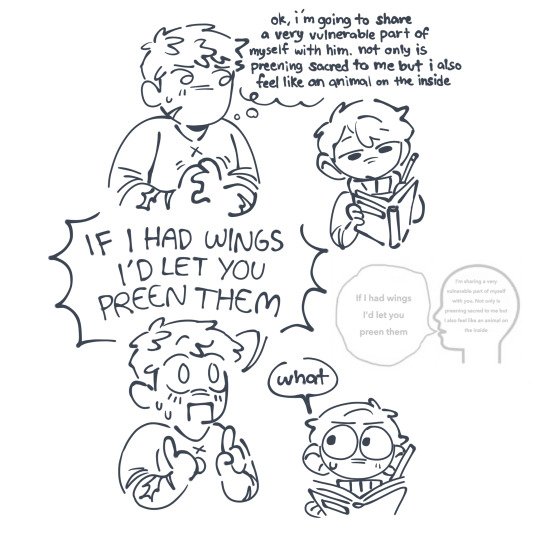

um ok cool thanks for letting me know .... why are you telling me this
#yeah so on todays episode of guys who cant communicate their affections normally :#THIS IS THE ONLY WAY I CAN DESCRIBE IT. I WANT TO EXPAND AND I WILL MAYBE. BUT THIS COMIC IS HOW THEY ARE IN MY HEAD#I CANT EXPLAIN IT IN ANY OTHER WAY OTHER THAN SHITPOSTS#for some reason i cant stop making shitposts that i take 100% seriously and put alot of thought into but cant say it in any other#form than a stupid shitpost#im hoping. praying that someone gets this#WHATEVER. YOULL GET IT WHEN I DO THE DAMN THING I WAS MEANT TO BE WORKING ON WHEN I WAS DOING THIS#OH ALSO I EXPERIMENTED WITH SCARS ON LAIOS because i saw someone else do it and i think its cool#chilaios#fucking sure ill put this in the other tags too#chilchuck#laios#thats it#otherwise ill get embarassed#guhhh DO YOU GET IT DO YOU UNDERSTAND MEEE
1K notes
·
View notes
Text




would anyone listen to this? the ramblings of a lunatic?
#sad•leonart#rottmnt#rise of the tmnt#rottmnt leo#rise leo#rise leonardo#rottmnt leonardo#has the idea this morning and drew it all today#had motivation for the first time in a while#long canvas go brrrrrr#yall have fun with this one#theres a lot of symbolism here#if anyone wants me to explain the main stuff i can- like the colours and who they represesnt#bpd leo#also idk what this design is but i was vibing with it#so i kept it
2K notes
·
View notes
Text
There’s something so cynical about a podcast episode about climate change being sponsored by an airline.
Specifically an episode that discusses how companies have worked hard to deflect blame from themselves onto consumers.
Anyways capitalism is going great.
1 note
·
View note
Text
More stuff for me to worry about.
0 notes
Text

© Paolo Dala
Photography In The Brave New World Of AI
"In the not too distant future, realistic-looking images would have to be labeled, like words, as either fiction or non-fiction, because it maybe impossible to tell them apart. We may have to rely on the image-maker and not the image to tell us into which category certain pictures fall..." (Ritchin, 1984)
[In 1984,] I found out that with these very expensive machines, you can use software to manipulate photograph in ways that were undetectable. I began to thing that the credibility of photography as a witness is vulnerable at that point.
I've been picture editor of the New York Times Sunday Magazine and on weekly basis we were showing photographs of the civil war in El Salvador [and] Khomeini taking power in Iran... You can have a view that varies with other people, but for example in the Vietnam War, for the 9 year-old girl who's burning, from Napalm, everybody agreed that was happening. You might think that the war should continue or should not continue, but it was a common reference point. And what troubled me then and what troubles me even more now is if that breaks down, then we really have no sense of shared reality at this point in terms of what's happening outside of our immediate neighborhood...
We used to be able to believe with photographs as facts. They're reference points and incredibly important… We're going to lose it and we are losing it.
Fred Ritchin We Can't Trust Photos Anymore Today, Explained
#Fred Ritchin#Photography#AI#Vox#Today Explained#Podcast#Spotify#We Can't Trust Photos Anymore#Water#Ocean#Sea#Beach#Crystal Beach Resort#West Philippine Sea#Sunset#Sunset Sessions#San Narciso#Zambales#Philippines
1 note
·
View note
Text



Yeah, stingers don't do shit to metal.... But Mar doesn't know that, he's a slow learner alright (+Ortho intentionally let him sneak closer but let's not tell Mar about motion sensors before explaining first what's a robot)
Portuguese men'o war have few predators. But blue sea slugs are known to prey on them.
#Twisted wonderland#twst oc#ortho shroud#floyd leech#yeah not drawing accurately the dorm brooches on the armband not today#“what do you mean sea angel he's blue that's a sea slug!!!”#aight who will explain him Ortho 'cause the tweels certainly won't#twst shitpost#oh his palms have a cool jelly texture- very nice :)))#if you ignore the paralyzing sting
606 notes
·
View notes